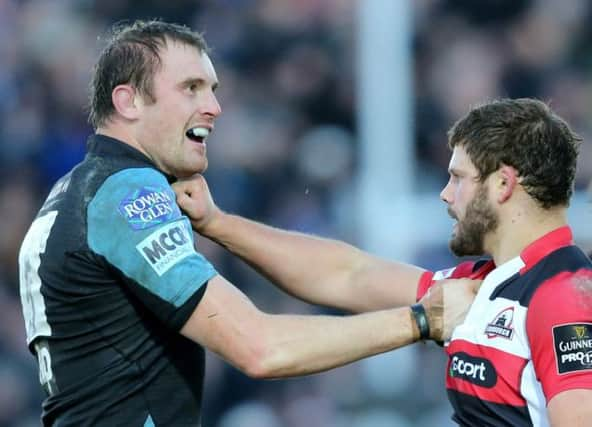1872 Cup: Townsend hoping to exploit extra width


While Scotstoun has a width of around 64 metres, the Edinburgh ground has the maximum allowed span of 70 metres, with the national stadium also boasting seven metres of extra length to Glasgow’s more limited home turf. As such, the Glasgow head coach’s decision to replace Sean Lamont and DTH van der Merwe with the searing pace of Sean Maitland and predatory menace of Tommy Seymour seems a message of intent that Glasgow will use their wide boys to attack Alan Solomons’ men on the flanks.
Glasgow’s last defeat at Murrayfield was in January 2011, since when they have compiled a record of two wins and a draw, and the visitors will travel with some confidence.
Advertisement
Hide AdAdvertisement
Hide Ad“[The extra width] is not a huge difference but it definitely makes a difference,” said Townsend. “You are playing on the biggest pitch you can play on. Ravenhill [Ulster] is a big pitch as well, as is the Ospreys’ ground, so it does mean there is more turf to defend.
“Factors that we always look at before games are the condition of the pitch, the dimension of the pitch and the weather. You can play the rugby you want to play more easily if the weather is better. If it stays dry and cold, that would be good.
“But, with the bigger pitch, defences might be spread and that can mean holes open up. They might show you the outside so you go there, but it is harder ball to win, so there might be more turnovers.”
Townsend has made ten changes to the Warriors team that claimed a 16-6 first-leg victory and earned themselves a vital cushion as they look to retain the 1872 Cup for the sixth successive season.
Of these, Rob Harley (leg) and Duncan Weir (bicep) and Henry Pyrgos (knee) are injured and replaced at openside, stand-off and scrum-half by Tyrone Holmes, Finn Russell and Niko Matawalu respectively. Jonny Gray returns at lock, with skipper Al Kellock’s man-of-the-match performance at Scotstoun six days ago helping him to retain his second-row place.
Townsend has also taken the bold step of fielding a completely different front-row, with his preference of Jon Welsh over Euan Murray the most noticeable of these changes. At full-back, Peter Murchie’s greater security under the high-ball is preferred to Stuart Hogg, who is benched.
Turning his attention to his selection for tonight’s encounter, Townsend said: “It’s great that we’re able to welcome back some players who were rested last weekend and this allows us to freshen up the squad.
“A number of players have earned the opportunity to play in this fixture and we’ll need to play better tomorrow night if we’re to come away with a positive result.”
Advertisement
Hide AdAdvertisement
Hide AdWith defences on top in a brutal first-leg encounter, Townsend was pleased with his side’s obduracy, but he has warned his charges they must produce quicker ball if their attacking élan is to flourish tonight.
“Physicality is a big part of our game. Big tackles are what you want to see. We were pleased with our defence and I thought Edinburgh defended well, too, but, from my perspective, the physicality was really good.
“We know we have to keep improving defensively, in the contact area and create quick ball. Another aspect that pleased me was that there were no yellow cards, so, in terms of the macho element, I felt we kept our discipline very well.”
But Townsend’s irritation with referee George Clancy’s failure to consult his TMO over the disallowed second-half Niko Matawalu try that would have given Glasgow an even greater advantage to take along the M8 still rankles.
“I left a message with them [match officials], but I haven’t spoken with them. I mentioned that after the game. The TMO was introduced first of all for try scoring plays. We believe the pass was the same pass that Peter Horne got in the first half, going back from a wing to a supporting player,” said Townsend.
He continued: “With Sky TV, we had a couple of angles and you could see from overhead that pass went back. If the referee doesn’t believe that a pass went back, you are in an area where a great try has been scored, everyone is celebrating, you think the pass went forward but you can at least check.
“The referee was 15 yards behind play and seven or eight yards to the right of it. I’m not sure that he can make that call without the help of a TMO.
“There has been debate about referees being able to make decisions, and I agree referees have to make decisions on their own, but when you are not in line with the try-scoring play, and you have someone you can refer to.....”
The Glasgow head coach left unsaid what he clearly felt was the obvious answer.